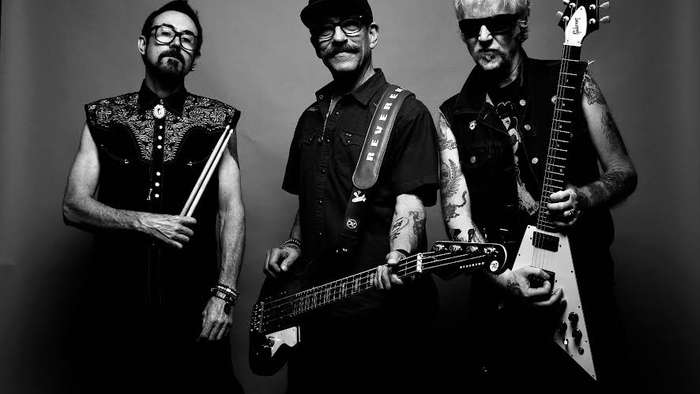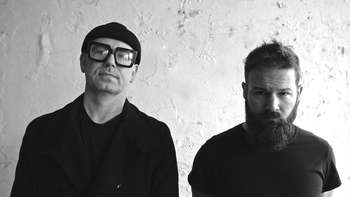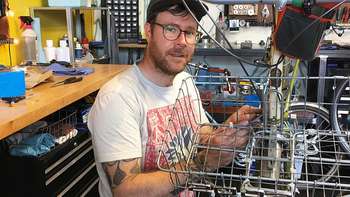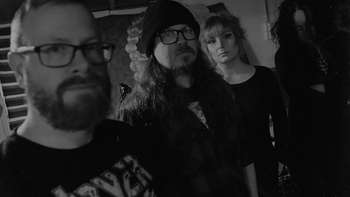UltraBomb is Greg Norton - Bass (Hüsker Dü), Finny McConnell - Vocals and Guitars (The Mahones), and Derek O'Brien - Drums (Social Distortion), replacing Jamie Oliver (UK Subs).
References are being dropped like an UltraBomb (like that? ha!) so, that being said: are they a supergroup or power trio? Neither is probably too far off the intended red bullseye. However, when you amalgamate these two credentials, you get an unadulterated double espresso slow-drop explosion of rock n’ roll straight along the sulci to the human brain's cerebral cortex. Well, here you thought I would use more food analogies with Greg Norton's background as a chef in the ever-busy world of the restaurant business -- which we indeed touch upon.
I invite you to walk on hallowed ground where kings once tread and clutch in your sweaty palms the second pressing (out now) of UltraBomb's Dying To Smile. Don't miss out this time. Don't be omniscient. Tune in, tune up. Turn up and let it rip! Good rock ‘n’ roll is good for the mind, body, and soul.
I had the opportunity to talk to Greg Norton about UltraBomb, his past musical endeavours, his background in the food industry, his opinion on dynamic ticket pricing and a lot more. Dig in! Bon appetit! Oh, and don't forget a nice bottle of dry red wine to wash over your palette.

Scene Point Blank: I read that Finny McConnell (The Mahones) had reached out to you as he knew you were between projects, and he had Jamie Oliver (U.K Subs) lined up as a drummer. The next thing you know, you are on your way to Berlin to meet and check them out, which led to Time To Burn being born. After that, I believe you were going to play Toronto, but the gig got cancelled. There seemed to be a lot of buzz around it as well.
Greg Norton: Right. After we recorded Time To Burn we were going to try to get over and play some shows in Canada quickly and then those shows ended up being cancelled because there were COVID restrictions still in place. Then we had some more dates set up, and then my sister came down with leukemia. She's doing better; however she was in the hospital for a month. Then Jamie couldn't get in because he couldn't get a visa. You know we were just tripping over everything and then I had my prostate diagnosis and I had it removed about two years ago and I'm in excellent health now. Then to make matters worse, I was a fucking idiot and got a DUI in Minnesota. So that's kind of a hold-up right now for getting me into Canada. I am working on the temporary resident permit. We are with the Atomic Music Group and James McLean's office is in Toronto so we will be able to show them that I have a legitimate business reason to cross the border and that I won't be a menace to society. So hopefully that will all be cleared up soon and we will be playing dates in Canada soon.
Scene Point Blank: I saw that Finny posted something about not playing outside of Canada for the rest of the year.
Greg Norton:: I won't go into great detail but, yes, he did post that he wasn't playing outside of Canada for the rest of the year.
Scene Point Blank: Well sometimes life gets in the way of life. I think it is a testament to the strong bond between the band. Ironic that you are having difficulties coming to Canada and Finny getting into the States and, to top it off, Jamie having visa issues.
I saw that Jamie also organized a GoFundMe to help with your treatment which is another sign of unity.
The medical system is completely different in Canada, as you're probably aware of the socialized medicine model. It is one thing that deters me from moving to the States.
Greg Norton: Yeah, I know it. It's ridiculous down here that there's no reason why people should go bankrupt just to stay alive. It's the medical industrial insurance complex and you know Big Pharma has their hands in that. We're the only first-world country in the world that doesn't have some sort of universal health care system and it's completely ludicrous.
Scene Point Blank: I had a friend who ended up dying of an HIV-related issue and he told me around that time Obama was trying to bring in socialized medicine that there were commercials on the television of little old ladies who were saying things like, "I don't want the government knowing about my health care and I don't think you do either,” haha. I think there was a lot of backlash against it.
Greg Norton: Oh yeah. The conservative push against that was that they were going to have death panels and they were going to decide. It's like, “Oh nope, you're too old we're just going to let you die. You don't qualify for health care,” and all this stuff and it was complete bullshit. You know socialism is a nasty word to conservatives.
They equate it to communism and things like that. No, we're talking about democratic socialism, where everybody benefits and does better when we all do better, essentially.
Scene Point Blank: A lot of my American friends think that we have to wait for hours and hours and hours and people are dying in the waiting room. There are times when we do have to wait -- especially in larger cities, it's more congested -- but, largely, I think it works. I did experience it in the States when my son had an asthma attack several years ago and we had insurance through my work. When we showed up at the hospital there was a nurse specifically waiting outside for him, and they had a team of two doctors and three nurses looking at him. Meanwhile, other people are sitting in the waiting room and I think they see us as money. Okay, I think we established that the U.S. health care is fucked up, haha…
Greg Norton: Yes, it is quite elitist. If you are rich you get care.
Scene Point Blank: I noticed on your new release you did a Ruts cover and on the last release you did a Rocket From The Tombs/Dead Boys cover. How did those choices come about?
Greg Norton: I am going to say The Ruts cover was brought in by Jamie, as they are British, but I could be wrong about that! However, I do remember we were on the tube on our way to the studio on the first day in London and Jamie expressed, since we were in London, we should do an iconic British punk song. I believe Finny thought we should do a Who cover but I wasn't sure that was the right band to cover in this project. Jamie played us The Ruts’ In a Rut and we were all like, “Yes, this is amazing.” Being the American, I wasn't as familiar with them. Jamie let me know they were huge and still going as Ruts D.C. It is like an anthem and one of their bigger songs...the audience would sing the chorus with the band when they played it live. I think it turned out great.
Scene Point Blank: It is a great cover, coming from a huge Ruts fan. I have spoken to Henry Rollins about them. He is a huge fan. He has the album cover's original painting (The Crack).
Greg Norton: I believe Rollins sang for them when they kind of got back together.
Scene Point Blank: Yes, when Paul Fox was very sick with cancer Henry sang for them. Three months later he succumbed to the cancer, sadly. It is known that Henry is a big record collector. Another friend won on eBay an autographed set list, I believe including Malcolm Owen's signature. Henry was quite gutted that he had not seen the listing. Henry encouraged me to obtain some Ruts DC releases and had told me at the time that The Ruts were thinking of doing one last show with Paul and looking for a singer. I suggested that he should sing for them. Now, I am not suggesting that it was my idea at all and that it wasn't already in the works. Henry did a great job in capturing the intensity of The Ruts. The Crack is one of my favourite records (however I do have many!)
I am curious what your musical upbringing entailed. I know you worked in a record store for a while. I am just finishing Peter Jesperson's book and Hüsker Dü is mentioned quite a bit. Of course, The Replacements are mentioned a lot since he was the manager but another band, The Suicide Commandos, are also given a lot of mentions. I believe they predated Hüsker Dü. How important were they as a band to you and Hüsker Dü? Were they on your radar?
Greg Norton: Oh yes, they were together prior. However they actually played their last official concert shortly after we got together. Chris Osgood, the guitar player, became a friend and Bob took guitar lessons from Chris for a while. In the early Hüsker Dü days, Chris helped engineer. He helped with an early demo that we did. They were the big punk band in Minneapolis. In the late ‘70s they were on Blank Records along with Pere Ubu. I think The Suicide Commandos Make A Record and Pere Ubu’s Modern Dance were the only two bands that got released on Blank Records. The Longhorn was the CBGB of Minneapolis. At full capacity, they would open up the back room. The Stranglers played there, Elvis Costello, Talking Heads, Blondie, The Dead Boys, Pere Ubu, and Buzzcocks. Damn, many a great band played there and came through Minneapolis at the end of the ‘70s. The Police played there as well. We went there all the time and there was also a great local scene.
The Replacements started at the same time we did, so we played a lot of shows with them in the early days. Around the end of 1981, The Longhorn changed, and they moved the music to an upstairs room. They also changed the name to Zoogies and were trying to rebrand themselves as a pizza parlour. At this point, 7th Street Entry was already open. Pretty much everyone moved over to 7th Street and we took it over. It was our little punk clubhouse. It didn't matter who was playing: we would all go and hang out and support the bands no matter what their style of music was. It was a very interesting and great time.
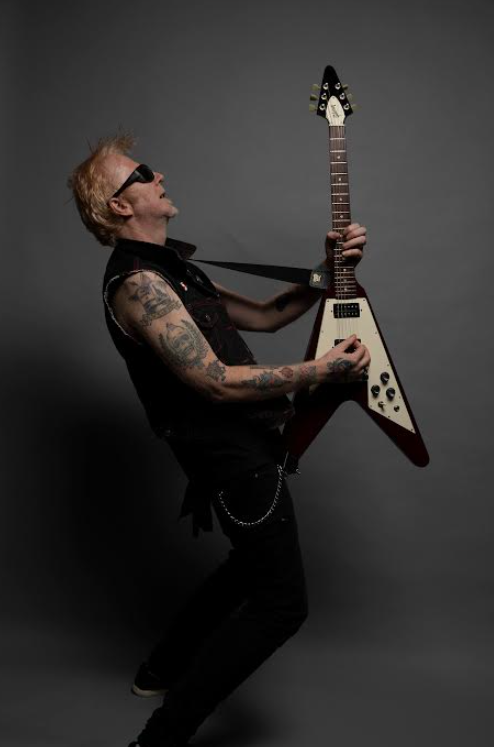
Scene Point Blank: There was another band called The Suburbs that was big locally.
Greg Norton: The Suburbs were a fantastic punk band when they started, then they went kind of new wave with horns and such. They got signed to A&M Records and had a big hit in Minnesota with a song called “Love is the Law.” They are still around and they still sell out First Avenue. They usually play there a couple of times a year. We're talking about 1,200 people showing up. I think locally they're probably the most loved Minnesota band. That is pretty cool in itself.
Scene Point Blank: I always heard they had a huge fan base. I always thought Suicide Commandos were the ones that were most loved.
Greg Norton: Yeah, but they broke up by like 1980, so they were done. Steve, their bass player, moved to New York after that and still lives there.
I think they actually got back together and played a show just a few years ago -- might have been for a benefit. I wasn't able to go, but Chris Osgood is still really involved with Minnesota arts and Dave Ball is still in town. If the Commandos had stayed together they probably could have taken the crown, but I'd say it's The Suburbs who took it. They have very loyal fans and that is great.
Scene Point Blank: Suicide Commandos had a highway named after them.
Greg Norton: Actually, I think it is a section of a road named after them.
Scene Point Blank: I just looked it up... It was that adopt a highway program. Mommy, what's a Suicide Commando?
Did you frequent the Oar Folkjokeopus record store?
Greg Norton: Oh yes, definitely. Folkjokepus was like our Bleecker Bob’s and The Longhorn was our CBGBs. Folkjokepus was in south Minneapolis, and that was that was the store to go to. They would have in-stores all the time. That's where you would find the latest singles and imports. Eventually, other record stores came around like Northern Lights, which is where I worked when the band got together. We rehearsed in the basement of Northern Lights for a long time. Oar Folkjokeopus was a great spot though.
Scene Point Blank: It has come full circle with the vinyl resurgence. For me, it never really went away. I like the hub of the community and shooting the shit with the people who work there (or get yelled at if you ask stupid questions, haha). My kids roll their eyes when I go into a record store. I am that guy that has to go through everything.
Greg Norton: They were safe spots for kids to hang out and get educated on music. You would be exposed to new music and meet other like-minded people. I know there are record stores out there, but I don't think kids are hanging out in them. I could be wrong about that. Hoping they still have that opportunity.
Scene Point Blank: I think there are stores where people still go to hang out for a bit and get musically educated. Today music is very accessible. You can do more research on your own. Spotify etc will suggest other like bands. It is a different world. A good portion of learning of new bands by word of mouth has disappeared.
Greg Norton: Exactly. It was an information hub to what is new, what is happening, what bands are coming to town, etc. Now it's all on your phone. The crazy thing with streaming music is, if you don't capture their attention within the first five seconds of the song, they swipe to the next thing. That is a little infuriating. In a record store, they would put on a full LP and you could check the whole thing out.
Scene Point Blank: Certain records take time to absorb. I listened to Ultrabomb Dying To Smile three times in a row to truly understand it and have it penetrate my mind.
Greg Norton: I can look at numbers on Spotify and it's always like the first song on the record that gets the most listens. By the time you get to the last song, it's got the fewest streams. However, the second song at one point took over the lead spot, so I figure that song must be resonating with the listeners as they are gravitating to it. It is crazy to watch the numbers change like that.
Scene Point Blank: Does it give you insight into where the streams are coming from or any other demographics?
Greg Norton: Yes, it breaks it all down and gives you the age, demographics, gender and what countries where it is being streamed. It is pretty interesting.
Scene Point Blank: Do you have many opinions on Spotify?
Greg Norton: Well, they're the evil empire, but it's a necessary evil, unfortunately. It’s just the way the music industry works these days. Something has to change so that artists are better compensated. Without the artist, the platform will collapse. It used to be about radio airplay and It was easier to get paid when people listened to your music.
Scene Point Blank: Don't you get a cent for every stream?
Greg Norton: I believe it's one-third 1/3 of a cent.
Scene Point Blank: I think most bands these days make their money off of touring and merchandise.
Greg Norton: That's the main source of income for artists, unfortunately. You don't make a lot of money off the actual music.
Scene Point Blank: On that note, you spent many years in the restaurant business. You are in that industry at all anymore?
Greg Norton: I got out of the restaurant business in 2010. Good time to get out. Right before COVID too, right? The music industry took a hit, but so did the restaurant business as well.
Scene Point Blank: Did you take anything that you learned from playing in the band into the restaurant business and into the world of being a chef?
Greg Norton:. I think there's a lot of parallels between the two industries, good and bad. The way my brain works, learning how to cook something is like learning how to play a song and then, when dinner service is on, it's like that's your set time and you're playing all of these songs and it's all about timing with the other people on the line. There's choreography involved with those people too, so that you're not running into each other. Then after service, everything is cleaned up and put away and then everybody goes and has a shift drink and talks about how the night's service was. It is similar to when your set is done and you're sitting around talking about how the show was, what went well and what didn't go as well, how the audience was and things like that. So I think there's a lot of similarities.
Scene Point Blank: When you were in Hüsker Dü was this always in your back pocket or was it something that happened after?
Greg Norton: I worked in restaurants mostly in the front of the house and as a waiter. In the early years of Hüsker Dü, I worked for a family-run Italian restaurant, they were gracious and gave me time off to go on tour then when I came back they always had a job for me. So when the band broke up, I just kind of naturally gravitated back to the restaurant world. I got back to waiting tables and then I met a very good friend, Lenny Russo, who was the executive chef at a restaurant where I was working. Lenny and I became great friends and he talked me back into the back of the house and started to teach me how to cook. He told me you've got two things that I can't teach people. You've got a really good palette and you've got a natural aptitude for this. So he mentored me for five years and I worked my way up through there, through the line and learning how the particulars of how a kitchen functions. I ended up becoming a chef and I had a 15 year run as one. I was a good, solid two decades in the restaurant business.
